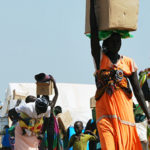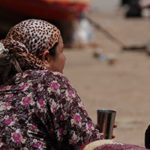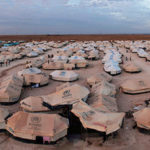This report is an update of a 2010 report, ‘Political Economy and Governance in the Democratic Republic of Congo (DRC)’, and is based on some of the recent literature on governance and political economy in the Democratic Republic of Congo (DRC). The report outlines the following key governance and political economy issues discussed in the literature: Political ...» more
Gender and conflict
What do we know about the role of gender inequality in producing or exacerbating the structural causes of violence and conflict, and about the multi-layered effects of violence and conflict on gender relations? What do we know about how to support gender equality in fragile and conflict-affected situations (FCAS)? This Topic Guide introduces the research evidence. ...» more
Radicalisation of diaspora communities
Much of the literature emphasizes that radicalisation cannot be attributed to any one factor, but is rather the outcome of a multiplicity of factors. Individual and community influences (micro level) include: Identity crisis: second and third generation immigrant and diaspora communities may experience ‘cultural marginalisation’ in terms of alienation and lack of ...» more
Formal justice in Iraq
The criminal justice system in Iraq remains weak. There are a wide range of reports (largely conducted by international NGOs, UN organisations, and state agencies) that reveal a consistent failure to meet international and domestic legal obligations. Areas of particular concern include: Arrest and detention: Iraqi security forces continue to engage in arbitrary arrest and ...» more
Refugee, IDP and host community radicalisation
Socioeconomic conditions: In some circumstances, poor socioeconomic conditions (e.g. impoverishment, unemployment, lack of access to services and infrastructure, overcrowded living conditions) may make it more likely for refugees/IDPs to become radicalised. However, Lischer (2005) finds instead that there is generally little evidence to support the connection between particular ...» more
Conflict sensitivity in education, the private sector and infrastructure development
Conflict sensitivity in education: There has been increasing awareness that education systems are not neutral. Education can exacerbate conflict if it increases social tensions or divisions between groups. This may be the case if: education policies and practice are inequitable; education systems reinforce identity grievances; or educational curricula promote militarism.It is ...» more
Conflict sensitivity
Reflection among aid actors after the devastating genocide in Rwanda led to the realisation that humanitarian and development actors contributed to increasing tensions and exacerbating the conflict. Aid interventions have since been understood to become a part of the context – and in conflict settings, to become part of the conflict. This acknowledgement that aid is not neutral ...» more
International legal frameworks for humanitarian action
International legal frameworks for humanitarian action provide guidance on delivering assistance in a variety of challenging contexts. They can also be powerful tools in advocating for, and achieving, the protection of civilians. ...» more
Sex selection – micro-level drivers and enabling/preventive factors
Key findings: Prenatal sex selection results in distorted sex ratios at birth (SRB). In many countries there are currently 110-120 male births per 100 female births (in contrast to the standard biological level of 104-106 male births). Postnatal sex selection also persists in several countries, measured by excess deaths among female infants and young girls. Sex selection is ...» more
Participation in transparency and accountability initiatives
Key findings: Transparency and accountability initiatives have generally tended to centre on achieving ‘downstream’ accountability, referring to the efficient delivery of policies and priorities. The focus here has been on the role of citizens in the implementation of policies. There has been insufficient exploration of how the incorporation of citizen voice and participation ...» more
PNPM/Community-driven development in Indonesia
Key findings: The National Program for Community Empowerment Mandiri (PNPM Mandiri) was launched by the Government of Indonesia in 2007. It is a national programme within the overall policy framework established to implement programmes aimed at poverty alleviation, and strengthening local governance and service delivery. PNPM adopts a community-driven development (CDD) ...» more
Monitoring and evaluation of electoral support
Key findings: Electoral support interventions by international actors comprise primarily of electoral observation and electoral assistance. Electoral observation should be of an impartial nature based on the principle of non-interference. Electoral assistance, in contrast, is of an advisory nature and refers to technical or material support to electoral processes. It may be ...» more
Violence against women and girls in Timor-Leste
Key findings: The high prevalence of gender-based violence, particularly domestic violence, in Timor-Leste is considered to be a key challenge for the country. Not only is the extent of gender-based violence a serious concern, but also the severity of the violence. Most of the available information on Timorese women and girls from 1975 to 1999 concerns experiences of sexual ...» more
Humanitarian work in Syria and Yemen
Syria and Yemen are both experiencing immense humanitarian and development challenges. Violent conflict, political and civil unrest, rising food and fuel prices, mass unemployment and breakdown in social services have contributed to massive displacement, food insecurity and acute malnutrition, difficult living conditions, lack of basic services and poor housing. Neighbouring ...» more
Changing attitudes and behaviours in relation to gender equality
This helpdesk report surveys literature on strategies and initiatives designed to increase awareness and to change attitudes and behaviours in order to promote greater gender equality. The structure of the report is based on the following areas: religious influences; community-level processes, alongside media and social campaigning; and activities targeting men’s attitudes and ...» more
Alternative livelihoods
The literature on ‘alternative livelihoods’ focuses primarily on efforts related to countering illicit drug crop cultivation. Links between illicit drug crop cultivation and armed conflict are noted in various contexts. Efforts to counter illicit drug crop cultivation are thus considered important to stability and security. The ‘alternative livelihoods’ approach is a ...» more
Youth statebuilding and peacebuilding interventions
Significant numbers of youth are directly affected by conflict and fragility. The various challenges they face in such environments can exacerbate the risks of violence and conditions of fragility. These challenges include: economic and political exclusion, loss of education and divisive education, trauma and the loss of family and social networks. This helpdesk research ...» more
Electoral support interventions
Electoral support interventions by international actors have increased greatly since the 1990s. They comprise primarily of electoral observation and electoral assistance. Electoral observation should be of an impartial nature based on the principle of non-interference. It involves the gathering of information on electoral processes and making informed judgments about the ...» more
Poverty and wellbeing indices
The Commission on the Measurement of Economic Performance and Social Progress was created in 2008 to explore the limits of GDP as an indicator of economic performance and social progress. Much literature in the past has critiqued the inadequacy of income measures. The Commission was also tasked with considering additional information and tools required to produce a more ...» more
Effects of political quotas for women
Many countries have introduced gender quotas (or political reservations), in order to increase female participation in policy-making. This helpdesk report surveys research on the effects of political quotas for women on (1.) political processes; (2.) service delivery; and (3.) social processes. There is limited empirical evidence on these issues and research that does exist has ...» more



